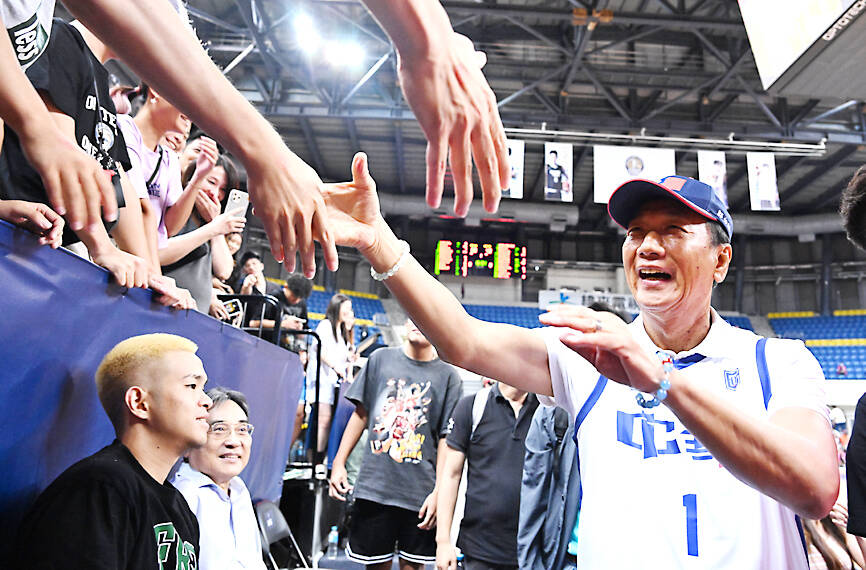Hon Hai Precision Industry Co founder Terry Gou (郭台銘), who is widely reported to be eyeing the presidency, has invited two opposition presidential aspirants to discuss cooperation to challenge the Democratic Progressive Party’s (DPP) candidate, Vice President William Lai, who is leading in the polls.
At a banquet held on Thursday by a so-called “alliance on mainstream public opinion” that he initiated, Gou said the opposition camp needed to work together if it hoped to defeat the DPP in January’s presidential election and push for Taiwan’s democratic development.
The main opposition candidates are New Taipei Mayor Hou You-yi (侯友宜) of the Chinese Nationalist Party (KMT) and former Taipei mayor Ko Wen-je (柯文哲), chairman of the Taiwan People’s Party (TPP).

Photo: Liao Chen-huei, Taipei Times
Gou is said to be considering an independent run at the presidency, although polls currently have him in fourth place were he to declare his candidacy.
While Gou acknowledged he lacked the election experience of Hou and Ko, he said Taiwanese want to see cooperation and unity in the opposition camp, and that mainstream opinion favors cross-strait peace, economic prosperity and clean politics.
Given that environment, Gou invited Hou and Ko to sit down and discuss an alliance focused on defeating the DPP’s Lai, whom Gou described as the “big bad wolf” in the fable The Three Little Pigs.
In that story, the three pigs fought off the wolf’s attacks by uniting behind a solid house made of bricks built y the youngest little pig, Gou said.
Such an alliance is how the opposition could work to defeat Lai and his party, he said.
The pro-independence DPP has undermined cross-strait ties and put Taiwan at risk of war with China, while also weakening Taiwan’s democratic mechanisms, he said.
Gou did not say what form this alliance would take or his role in it, but the appeal and invitation came as Gou himself has divided opinion in the opposition camp after losing to Hou in the KMT nomination process earlier this year.
Rather than holding an open primary, the KMT opted to “recruit” Hou as its nominee over Gou, citing internal party poll data that favored Hou.
Prior to the nomination process, Gou said that he would support whoever was nominated, but has since appeared to have gone back on his pledge, hurting support for Hou.
Ko did not immediately respond to Gou’s invitation, while Hou yesterday said he would visit Gou in person to demonstrate his sincerity in asking the Hon Hai founder for advice.
Hou said he tried to visit Gou three times in the past, but nothing was ever arranged.
In a response that could suggest a shift in his position, Gou seemed interested in meeting with Hou, and suggested that bygones be bygones.
KMT legislative caucus head William Tseng (曾銘宗) said that more than 60 percent of voters wanted to see the DPP defeated in the presidential race and that his party would do its best to achieve the goal.
He said the KMT welcomed any communication within the opposition camp.
TPP Legislator Jang Chyi-lu (張其祿) said Ko, rather than Gou, was the proper person to call on the opposition camp to unite, because Ko is ahead of Hou in most opinion polls.

Chinese Nationalist Party (KMT) Chairman Eric Chu (朱立倫), spokeswoman Yang Chih-yu (楊智伃) and Legislator Hsieh Lung-chieh (謝龍介) would be summoned by police for questioning for leading an illegal assembly on Thursday evening last week, Minister of the Interior Liu Shyh-fang (劉世芳) said today. The three KMT officials led an assembly outside the Taipei City Prosecutors’ Office, a restricted area where public assembly is not allowed, protesting the questioning of several KMT staff and searches of KMT headquarters and offices in a recall petition forgery case. Chu, Yang and Hsieh are all suspected of contravening the Assembly and Parade Act (集會遊行法) by holding

PRAISE: Japanese visitor Takashi Kubota said the Taiwanese temple architecture images showcased in the AI Art Gallery were the most impressive displays he saw Taiwan does not have an official pavilion at the World Expo in Osaka, Japan, because of its diplomatic predicament, but the government-backed Tech World pavilion is drawing interest with its unique recreations of works by Taiwanese artists. The pavilion features an artificial intelligence (AI)-based art gallery showcasing works of famous Taiwanese artists from the Japanese colonial period using innovative technologies. Among its main simulated displays are Eastern gouache paintings by Chen Chin (陳進), Lin Yu-shan (林玉山) and Kuo Hsueh-hu (郭雪湖), who were the three young Taiwanese painters selected for the East Asian Painting exhibition in 1927. Gouache is a water-based

Taiwan would welcome the return of Honduras as a diplomatic ally if its next president decides to make such a move, Minister of Foreign Affairs Lin Chia-lung (林佳龍) said yesterday. “Of course, we would welcome Honduras if they want to restore diplomatic ties with Taiwan after their elections,” Lin said at a meeting of the legislature’s Foreign Affairs and National Defense Committee, when asked to comment on statements made by two of the three Honduran presidential candidates during the presidential campaign in the Central American country. Taiwan is paying close attention to the region as a whole in the wake of a

OFF-TARGET: More than 30,000 participants were expected to take part in the Games next month, but only 6,550 foreign and 19,400 Taiwanese athletes have registered Taipei city councilors yesterday blasted the organizers of next month’s World Masters Games over sudden timetable and venue changes, which they said have caused thousands of participants to back out of the international sporting event, among other organizational issues. They also cited visa delays and political interference by China as reasons many foreign athletes are requesting refunds for the event, to be held from May 17 to 30. Jointly organized by the Taipei and New Taipei City governments, the games have been rocked by numerous controversies since preparations began in 2020. Taipei City Councilor Lin Yen-feng (林延鳳) said yesterday that new measures by